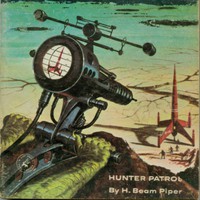U-4714, Robert F. Clifton [ebook reader for surface pro TXT] 📗

- Author: Robert F. Clifton
Book online «U-4714, Robert F. Clifton [ebook reader for surface pro TXT] 📗». Author Robert F. Clifton
At 1300 hours and after lunch Dresner entered the control room. He stopped and stood beside the radioman. “Anything?”, he asked.
“Yes sir, I'm decoding it now. It will be a little while sir before the decoding is finished”, said the operator.
“Very good. I'll be topside. Let me know what you have when you're finished”.
“Yes sir”.
As he began to climb the ladder to the conning tower, Reinhardt said, “Coming up Herr Sauer”.
“ Very good Captain. Do you wish the con?”
“No, are we on course?”
“Yes sir, maintaining north two degrees, full ahead, estimated speed, fifteen knots”, said Sauer.
“Excellent”, said Dresner as he scanned the horizon with binoculars”.
“Message decoded sir”, said the radioman shouting up through the hatchway that led to the conning tower.
“Coming below”, said Reinahrdt.
Back in the control room. Dresner read the latest message from U-Boat Command. “Sector 37D assigned U-4000. Now awaiting contact with same. Weather reports of utmost importance for entire conduct of war, judgment as to air, situation”.
Reinhardt handed the typed message to Dieter Falkner and said, “I'll be in my quarters”. When he entered the small area reserved for the Captain, Reinhardt, picked up the log book and entered the date and time he received the latest message from headquarters. It still bothered him that U-boat Command insisted on weather reports, but orders were orders and he would send weather reports when he thought that it was safe to do so. At the moment he did not know what caused the sinking of U-4000. It might have been the deck gun on the freighter , but it also might have been a torpedo attack from a British or American submarine that still might be in the area. As a result he had no intentions of sending another radio signal that could be picked up by RDF and expose his location. He would wait. Meanwhile, the boat was making good time crossing the North Atlantic. Soon, he would be in Lorient. Hopefully, he would find mail from Hedda and his mother. He gazed upon the photograph of his wife taped to the wood paneled bulkhead of his quarters and wondered how she was. Then, of his mother, now a widow living in an area constantly bombed night and day. He glanced at his wristwatch and realized that it time to change the watch. He left his cabin and proceeded to the control room. Seeing Sauer he said, “Take bearings, let me know where we are at and weather conditions.”.
“Yes sir, but the cup anemometer is rusting. It needs grease before I can get a true reading”, said Sauer.
“Very well. Do it”, Reinhardt replied, as he walked to the chart table. While there he waited for Sauer to give him the bearings. “ Latitude, thirty degrees, ten minutes, ten seconds, Longitude minus fifty, forty six minutes, fifty two seconds”, Sauer said shouting down the hatchway into the control room”.
“Danke Schon. What about the anemometer?”, asked Reinhardt”.
“We're lubricating it now sir. Should be operating in a few minutes”.
“Very well”.
“Standby for weather report”, yelled Sauer.
“Standing by”.
“ Conditions clear,temperature, twenty Celsius. Wind speed thirteen point zero knots, barometric pressure, thirty and steady sir”.
“Excellent. Keep a sharp lookout particularly for air craft coming out of the sun”, Reinhardt ordered.
“Yes sir”.
“Cook, whats for lunch today?', asked Reinhardt.
“Canned mackerel ,canned potatoes and canned fruit sir. All of the fresh food is gone. I cook out of cans and we eat out of the cans until we get home", said the cook.
“I am sure you will do your best Johan”, said Reinhardt.
“I will certainly try sir”.
Turning to the radioman Dresner said, “We will transmit tonight. That way if there are air craft about we have a better chance of diving to escape an attack should they locate us. Surface ships and submarines probably all have RDF by now. Anyway, play some music for the crew. Fifteen minutes and have Friehoffer scan with the hydrophones. Do not, I repeat do not use sonar”.
“Yes sir”.
Near midnight the U-4714 rocked gently as it raised up and over large swells. Unable to sleep Reinhardt got up and out of his bunk and made his way to the control room. When he got there he saw the radioman frantically, decoding an incoming message on the cypher machine. “Anything important?”, asked Dresner. Instead of answering the man handed Reinhardt the message. He looked at it and read. “June 6, 1944 Actung! Actung! British, American and Canadian landings at Normandy, France U-4714 to abort Lorient. New orders. U-4714 to head for Bordeaux. Repeat, U-4714 to head for port of Bordeaux.
Dresner handed the message to Falkner and said, “Read this and then let the crew know. Looks like the Wehrmacht will be facing a two front war”. He then went to the chart table and looked at the map and chart of Bordeaux, France. He knew that the Italians had built submarine pens in Bordeaux and that the Kriesmarine had acquired them when Italy surrendered to the allies, but he had never been there. He looked for, but was unable to find any charts on the Garonne River, a watercourse he would have to maneuver to get to the Bordeaux pens. “Rig for red light”, he ordered, using the red lighting in the control room to allow his eyes to adjust to the darkness when he went topside to the conning tower. After awhile he went up and into the tower following Falkner.
It was a beautiful night, a million stars filled the heavens a gentle breeze blew from east to west and the temperature allowed the wearing of a sweater. Reinhardt looked at the dark ocean and thought of home and Hedda. “Now,a two front war will put an additional burden, not only on the army, but the German people. There will be shortages of food, medicine, places to live, new rules, laws and regulations as the British and Americans advance from the west and the Russians from the east. What of my wife? What of my mother? How will I know how they are? How can I contact them when all communication systems will have priority for the army? Still, I am the Captain of a German Naval U-Boat. A boat that is still able to operate, to fight, to attack the enemy, a boat that is a strategic weapon serving the Fatherland. We must go on, win or loose no one will be able to say that we did not do our duty. Yet, I am torn between my duty and love of my country and the love of my wife. All I can do is what thousands of others are doing, pray that the loved ones at home will survive”.
Chapter Nine
Newfoundland
At 1640 hours on June 10,1944 Reinhardt Dresner on the bridge of the U-4714 watched the pilot boat leading the U-Boat up the River Garonne which led to the submarine pens of Bordeaux, France. By the looks of the surrounding area he could see that there had been air raids recently, yet no allied bomb had been able to penetrate the reinforced concrete built to protect the submarines.
The river was calm with a surface that looked like glass reflecting the
dwindling sunlight appearing as a melted gold shimmer as the two boats neared the harbor. Reinhardt watched as Oberleutnant Sauer and the Chief Boatswain saw to it that crew members manned the lines as the boat neared the interior dock. Dresner immediately noticed the change in temperature as the U-4714 entered under the massive concrete roof.
Void of sunlight, electric light burned for twenty four hours a day allowing workers to weld, rivet, paint, scrub and scrape. From the bridge Dresner saw the sparks created by a welder as he joined steel to steel. He also saw a Kapitan zur See and an aid waiting for him on the dock.
Dresner ran his right hand over the beard he had grown on this last patrol. As they neared France and the inlet of the River Garrone he had taken a salt water shower without the special soap supplied to U-Boats. This morning he dressed in his dress blue uniform now wrinkled and creased caused by folding and storing it in the small locker in his quarters, but at least it was clean. Leaving the conning tower and going down on deck he stepped off of the boat and on to the dock. After saluting the Captain zur See he said, “Kapitanleutnant Reinhardt Dresner reporting as ordered sir, as he saluted.
“Willkommen to Bordeaux Dresner. From reading your cipher reports I see that you had a satisfactory patrol”, said the Kapitan zur See.
“Yes sir. Still I believe it could have been much better”.
“How so?”
“More enemy ships, less hunting air craft”.
“Excellent, excellent. Dresner while your boat is being refitted, your crew may have leave here in Bordeaux. I want you to dine with me this evening. Please bring your log, I wish to read it”.
“Yes sir. May I ask where and at what time sir?”
“Here, at headquarters. You, your boat, officers and crew are now assigned to the Twelfth U-Boat Flotilla. Let's say at twenty hundred hours”.
“Yes sir, thank you for the invitation. That gives me time to wash away the U-Boat stench, particularly the odor of diesel oil”.
“There are hot showers available at the Officers Club and in the enlisted personnel barracks”.
“Again, thank you sir. Until this evening then”, said Dresner as he saluted.
Later after a long, hot, shower, shave and haircut, Reinhardt sat at the dinning table with Kapitan zur See, Adolf Smoger. A waiter placed a plate of Bavarian Hot Pot in front of both men, then poured each man a glass of red wine. “One nice thing about being assigned to the Twelfth Flotilla Dresner is the availability of excellent, French wines, Prost!”, said Captain Smoger.
“To your health sir”, Dresner replied.
“Thank you. Now, I wish to inquire why it was that after receiving messages from U-Boat command you refused to respond for several days”, said Smoger.
“Very simple sir. I was then and I am now, certain that enemy surface ships and submarines are using radio direction frequencies to pin point the locations of U-Boats. This information is then given to their long range air craft who then seek and destroy our boats either with bombs or depth charges”.
“What proof do you have Dresner?”
“None, but allow me to ask you, how many U-Boats were lost last month?”
“For the month of May, seventy seven”.
“Seventy Seven. What we don't know sir, was how many were on the surface radioing weather reports when they were attacked and lost. In the same way how many boats were lost attacked and torpedoed by the enemy listening to the U-boats sonar signal?”
“Let me ask you this commander what is your opinion of the zaunkonig (acoustic torpedo)?”
“We had no problem with them sir. Each one fired ran true to the target”.
“Interesting, we have reports that some have the tendency to circle and come back.”
“If that's so, I can't say”.
“You also reported what you thought was a lost U-boat in Sector 37D”.
“Yes sir. I base that on the amount of surface debris we fond on the water, plus the white cap of a U-boat Captain”.
“Could the U-boat been hit by one of its own zaunkonig's”.
“Anything is possible. At first I thought it was the result of a deck gun on the freighter that was sinking. At the same time it could have been a British or American submarine and of course the Wren, torpedo circling back”.
“What about the Hohenlohe?”
“That's hard to say. I used it. Naturally, I was concerned about enemy air craft catching me on the surface. However, since I never had radar contact with air craft or surface craft I can't give you an opinion either way. Actually, I am glad to have it.
“Then, how did you discover your targets?”
“Namely, through the use of the hydrophone





Comments (0)